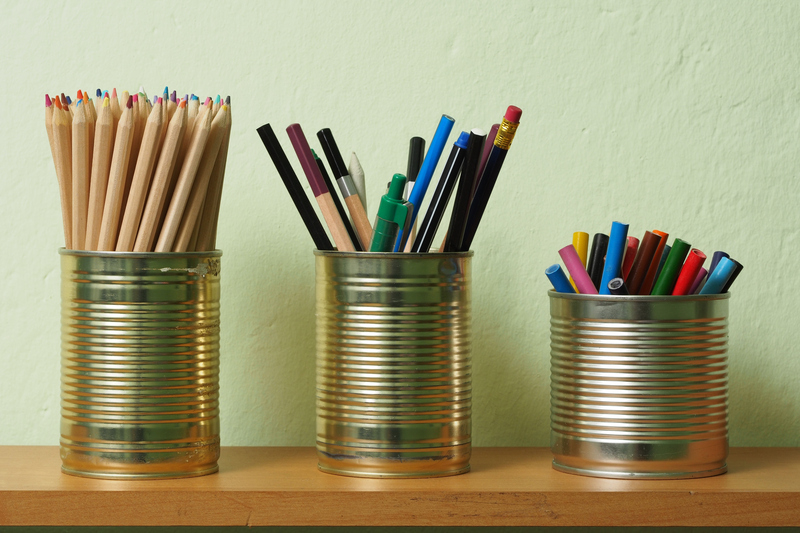Creative Ways to Dispose and Recycle Old Pots and Pans
Have you ever wondered what to do with your old, scratched-up cookware? When that favorite non-stick pan has lost its luster or your once-trendy copper pot no longer fits your kitchen, you face a dilemma--what now? Rather than letting them clutter your cabinets or contribute to landfill waste, why not explore creative and eco-friendly methods to dispose and recycle old pots and pans? This comprehensive guide presents ingenious solutions that are kind to both your home and the planet.
Understanding the Challenge: Why Proper Disposal is Important
Old cookware is more than just kitchen clutter. Many pots and pans contain materials--like aluminum, stainless steel, and sometimes coating chemicals--that can pollute the environment if disposed of improperly. Recycling cookware helps recover valuable metals and reduces environmental impact. Before tossing out your frying pan, consider these reasons to opt for creative recycling and upcycling:
- Environmental Responsibility: Metals take centuries to decompose, potentially leaching chemicals into soil and water.
- Resource Conservation: Reusing or recycling cookware conserves raw materials and reduces mining impacts.
- Personal Satisfaction: Transforming old items into something useful is creatively rewarding!

How to Decide if Your Old Pots and Pans Can Be Reused or Need Recycling
Before you dispose of your cookware, assess its condition. If it's still functional--even if scratched or outdated--it might benefit someone else. If it's damaged beyond repair (deeply scratched non-stick coatings, warping, severe rust), recycling may be best.
- Still Functional? Consider donation, resale, or repurposing.
- Damaged Beyond Use? Focus on recycling or creative upcycling ideas outlined below.
Top Creative and Eco-Friendly Methods to Recycle Old Pots and Pans
1. Scrap Metal Recycling Centers
Recycling metal cookware is one of the most sustainable ways to dispose of pots and pans. Many local scrapyards and recycling centers accept:
- Stainless Steel
- Aluminum
- Copper
- Cast Iron
How to recycle pots and pans at metal centers:
- Remove any non-metal parts--plastic handles, rubber grips, or glass lids.
- Clean thoroughly--centers may reject items with heavy food residue.
- Call ahead--ask about material requirements and drop-off procedures.
2. Donate to Charities or Thrift Stores
If your cookware is still usable, donating old pots and pans gives them new life. Organizations like Goodwill, Salvation Army, or local shelters often welcome kitchen kit donations. Ensure cookware is clean and safe. Donation is a wonderful way to help people furnish new homes affordably while reducing waste.
3. Sell or Give Away Locally
Not ready to part with your pots for free? Try selling or offering them online using platforms such as:
- Facebook Marketplace
- Craigslist
- Freecycle
- Nextdoor
Highlight that your items are well-used but functional. You'll be surprised by how many DIY-ers and college students seek affordable, pre-loved cookware!
4. Upcycling: Transforming Old Pots and Pans Into Decor and More
Ready to get crafty? Upcycling old cookware breathes new life into your kitchen castoffs. Here are some creative ideas to get you inspired:
- Flower Pots: Drill drainage holes in the base and plant flowers or herbs. Pots and pans make quirky outdoor planters or indoor pots!
- Wall Art: Paint or decorate pans and display them as vintage wall hangings. Non-stick pans are lightweight and easy to hang.
- Bird Feeders: Hang a saucepan from a tree, fill with birdseed, and watch the wildlife flock to your garden.
- Storage Solutions: Mount shallow pans on a wall to hold keys, mail, or craft supplies in a garage or mudroom.
- Clocks: Affix clock hands to an old frying pan for a unique wall clock--an excellent conversation piece for a kitchen or cafe.
- Candle Holders: Secure candles inside small pots or muffin tins for rustic votive displays.
- Serving Trays: Remove handles from pans and paint for quirky serving trays at parties.
Tip: Allow your imagination to run wild! Old pots and pans possess charm and strength--ideal for endless DIY projects.
5. Donate to Art Schools and Community Centers
Many art classrooms or craft groups welcome old cookware for creative projects. Metal pans are perfect for sculpture or mosaic bases, while enamel pots can be painted for theater props. Call local schools, makerspaces, or community centers and ask if they can use your unwanted items.
6. Use for Camping or Outdoor Cooking
Don't want to risk your good cookware on the campfire? Repurpose old pots and pans for camping! Even if they're dinged or scorched, they're perfect for open flames and outdoor messes. Store a few in your camping kit for hassle-free, guilt-free wilderness cooking.
7. Turn Pots and Pans into Gardening Tools
- Compost Scoopers: Small pots make ideal scoops for fertilizer or mulch.
- Tool Caddies: Large pans can organize gardening hand tools, gloves, and seed packets in your shed.
- Water Drippers: Perforated pans can distribute water evenly over garden beds when used as a watering aid.
Can Non-Stick and Teflon Pots Be Recycled?
One of the most common questions is, "Can you recycle non-stick pans?" Many recycling centers do not accept Teflon-coated cookware due to the chemical layers, which must be removed before metal recycling. Here's how to responsibly dispose of old non-stick pots and pans:
- Contact the manufacturer: Some brands offer take-back or recycling programs; check their websites for details.
- Scrap metal yards: Ask if they accept non-stick cookware or if they can recommend a facility that does.
- Mail-in programs: A few specialty recycling programs accept cookware by mail (such as TerraCycle or G&S Metal Recycling).
If these options aren't available, prioritize donation or upcycling over landfill disposal.
Important Disposal Tips for Old Cookware
- Check local regulations: Some municipalities offer household metal recycling or have specific e-waste days for unusual items.
- Prepare items correctly: Remove lids, plastic attachments, and non-metal parts to ensure acceptance at recycling centers.
- Clean thoroughly: Dirty cooking residues can attract pests or be rejected by recyclers and donation centers.
- Handle non-stick items with care: Flaking coatings should not be composted; seek specialized disposal or upcycling.
Brands Offering Cookware Recycling Programs
Many brands are stepping up to keep cookware out of landfills. Check if your cookware brand participates in recycling or trade-in programs:
- Calphalon: Calphalon's ReNew recycling program recycles old aluminum cookware when you buy a new set.
- GreenPan: Offers responsible recycling through select partners for their ceramic pans.
- Earth911: Provides an online database to locate nearby metal recycling drop-off points for all brands.
What NOT to Do When Disposing Old Pots and Pans
- Do NOT throw large metal cookware in the trash: It can damage waste equipment, leach toxic chemicals, and waste resources.
- Never burn coated pans: Burning non-stick coatings releases dangerous fumes.
- Do not compost any cookware: Pans, even made of "natural" materials like bamboo, are not suitable for compost bins.

Frequently Asked Questions About Pot and Pan Disposal
Are glass lids accepted at recycling centers?
Usually, no. Cookware lids are made from tempered glass, which is often not recyclable with standard glass. Check with your local recycler, donate, or upcycle as mosaics or sun catchers instead.
Can I put my old cookware in the curbside recycling bin?
Rarely. Most curbside services don't accept bulky, mixed-material kitchenware. Only metal recycling facilities or specialty events can process them.
Is it safe to use old, scratched non-stick pans?
Severely scratched non-stick pans may release chemicals that can be unsafe. It's better to replace or upcycle them instead of continuing to cook with them.
Conclusion: Make Every Pan Count
Disposing of old pots and pans doesn't have to be wasteful or boring. By choosing sustainable recycling strategies and creative upcycling projects, you help conserve resources, beautify your space, and inspire others to rethink their kitchen "junk." Try the above methods today, and spread the word: old cookware can cook up a new destiny!
Key Takeaways
- Recycle at local scrap metal centers--remove non-metal components first.
- Donate usable pans to thrift shops or shelters for maximum impact.
- Get creative--upcycle damaged cookware into planters, art, or organizers.
- Consult the manufacturer for non-stick and specialty pan recycling options.
- Never throw cookware straight into the trash--protect the planet and embrace creativity instead!
Looking for more recycling solutions? Explore our other guides on sustainable home living and creative reuse. Let your old pots and pans shine beyond the stovetop!